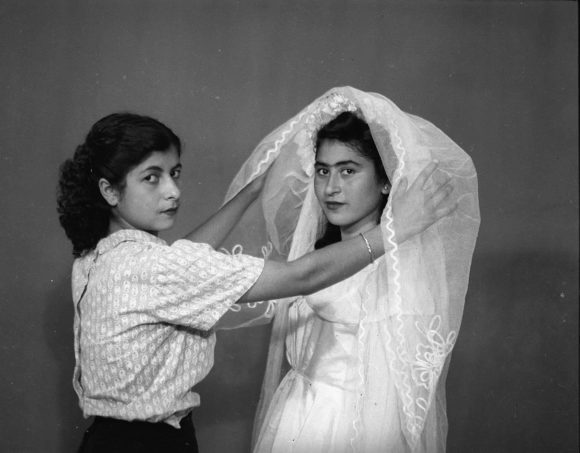 Arab Image Foundation
Arab Image Foundation


The Arab Image Foundation is a non-profit organisation based in Beirut, Lebanon. Established in 1997 by Fouad Elkoury, Samer Mohdad, and Akram Zaatari, and built by members Walid Raad, Lara Baladi, and Yto Barrada, amongst others. The foundation was conceived to locate, collect, preserve, study, and promote photographs, or the visual memory, from West Asia, North Africa, and the Arab diaspora, the initiative produces knowledge and raises awareness around the region’s photographic heritage.
The AIF boasts a collection of over 500,000 photographic objects and documents from the region, including negatives, glass-plates, and prints dating from the mid-nineteenth century to the present. These photographs include pre-war images, studio portraits, family albums, wedding photos, reportage, industrial photography, fashion photography, architecture, advertising, fine art, landscape and still life. Upon acquisition, the photographs are carefully conserved, accessioned, scanned, and stored in a temperature-controlled library. Additionally, the AIF has established an online image database of 20,000 photographs, making parts of the collection accessible to the public.
The collection was sourced by artists, researchers, and donors over the last two decades. From 1998 to 2002, the AIF members embarked on field trips in Lebanon, Syria, Jordan, Iraq, Egypt, Senegal, and across the Maghrib. Naturally, the founding members realised that the foundation’s goal has shifted from collecting and preserving to a desire to work on and with the collection. In other words, the artists’ quest to collect photographs has resulted in a dual focus of research/art projects, which dominated AIF’s practice from 1998 to 2010. For instance, Akram Zaatari researched the theme of the vehicle and made The Vehicle: Picturing moments of transition in a modernizing society (1999) and later, together with Walid Raad, they made Mapping Sitting (2002), which focused on portraiture taking the format of passport-sized studio photos and street photography. As such, AIF’s activities are not only limited to the act of collecting, preserving, and researching. In fact, the founding members have defined a curatorial and an artistic framework to make the collection visible and accessible to the public. Thereby, in addition to the artists’ projects, the AIF has organised around fifteen exhibitions since its inception. In tandem with these past exhibitions, the AIF has held public programmes and produced publications that sought to contextualise and unpack the relation between photography and society throughout modern times.
Following two major explosions in Beirut on 4 August 2020, the AIF office was severely damaged due to its close proximity to the blast site, akin to other institutions in Beirut. Consequently, many boxes containing photographs and negatives were intact. The team at the AIF came together, with a handful of volunteers, to clean, restore, and secure the collection. To respond to the crisis and the political instability, the AIF is considering moving to a new space, which will require rebuilding and considerable resources to preserve the collection.
Despite the socio-political and economic challenges in Lebanon, the AIF is a remarkable institution that continues to initiate ambitious projects by investing its resources to preserve and produce critical knowledge around this large and significant photographic patrimony of West Asia and North Africa.
Featured image: Copyright © Arab Image Foundation.


 Arab Image Foundation
Arab Image Foundation 
